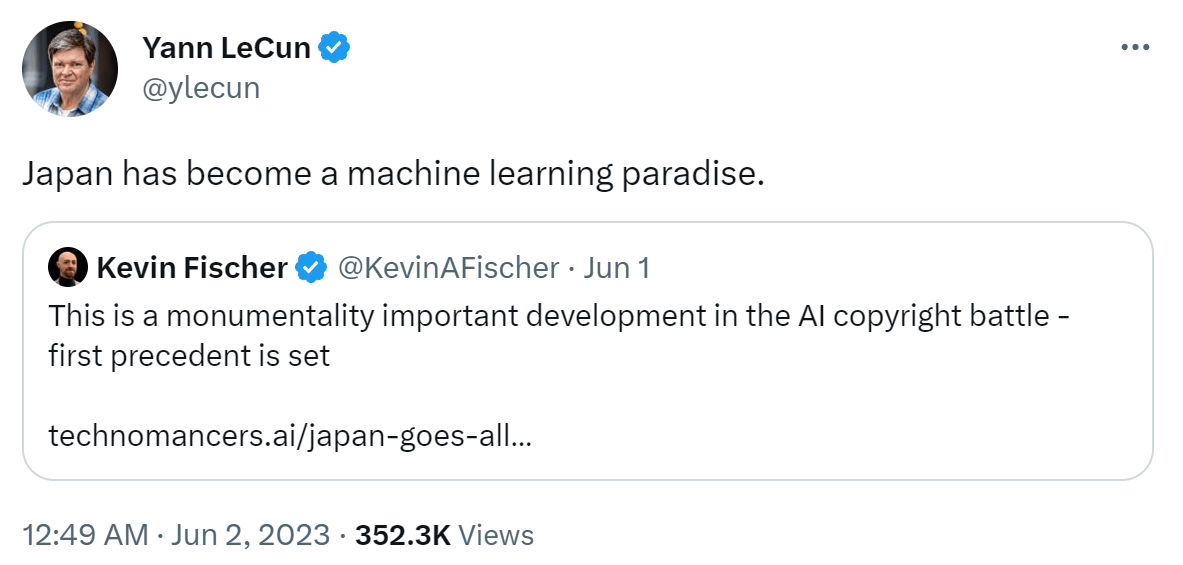 Technology peripherals
Technology peripherals
 AI
AI
 Don't you have to worry about copyright issues with AI training data? The Japanese government's stance sparked heated debate
Don't you have to worry about copyright issues with AI training data? The Japanese government's stance sparked heated debate
Don't you have to worry about copyright issues with AI training data? The Japanese government's stance sparked heated debate
Now that generative AI is booming, the copyright issue of the information data used to train the models behind it has always been the focus of people's attention - what is considered legal training data? Will I inadvertently infringe someone else's copyright?
In response, some foreign media reported that Japan’s government Artificial Intelligence Strategy Committee submitted a draft on May 26, stating that it would not force the data used in artificial intelligence training to comply with copyright laws. Japan’s Minister of Education, Culture, Sports, Science (equivalent to the domestic Ministry of Education) Keiko Nagaoka confirmed the news at a local meeting, saying that Japan’s laws do not protect the copyright of materials used for AI training.
 Keiko Nagaoka Picture source Japan’s "Ministry of Education, Culture, Sports, Science and Technology" official website
Keiko Nagaoka Picture source Japan’s "Ministry of Education, Culture, Sports, Science and Technology" official website
Specifically, on April 24, at the Second Subcommittee of the Settlement Management Supervision Committee of the House of Representatives of Japan, a Japanese congressman named Takashi Kii had a direct discussion with Keiko Nagaoka.
According to the questions and answers compiled by Ji Yilong after the meeting, it can be seen that when Keiko Nagaoka talked about Japan’s legal system (copyright law) on the use of AI for information analysis, she said “
In Japan, no matter how it is used, method, whether for profit or non-profit purposes, whether for conduct other than copying, or for content obtained from illegal websites, the information may be used to analyze the work.” In this regard, Ji Yilong believes that from the perspective of rights protection, the fact of "use against the will of the copyright owner" is problematic, and it is still necessary to formulate new regulations to protect copyright owners.
Additionally, they discussed issues regarding the use of artificial intelligence chatbots (such as ChatGPT) in schools as educational guidelines. Foreign media reported that the Japanese education system is expected to adopt this technology or tool as early as March 2024. In response, Keiko Nagaoka did not give a specific time, but said that she would reply "as soon as possible".
This matter has caused extremely extensive discussions. Meta chief scientist Yann LeCun, one of the three AI giants, posted this tweet on Twitter:
Japan has become a paradise for machine learning.
 However, some netizens accused him of not calling "being able to steal intellectual property rights without being affected" a "paradise". Yang Likun replied below the comment: The essence of what constitutes intellectual property "property" is defined and enforced by the government. of. It is also subject to government restrictions. The driving principle is to maximize the public good, not the rights of content owners.
However, some netizens accused him of not calling "being able to steal intellectual property rights without being affected" a "paradise". Yang Likun replied below the comment: The essence of what constitutes intellectual property "property" is defined and enforced by the government. of. It is also subject to government restrictions. The driving principle is to maximize the public good, not the rights of content owners.
In fact, netizens have launched a heated discussion around whether AI training materials should receive copyright protection. Some people agree with the Japanese minister's position and propose that a batch of image data to be trained will be processed layer by layer and eventually converted into AI models or data, codes or other electronic formats that can be understood by computers. That is to say, the data used for model training is basically highly lossy, so even in the worst case it is just a "derivative work", which is certainly fair use. Copyright infringement only occurs when a model copies copyrighted code, images, or books and distributes them in the final output.
There is an immediate objection to this: whether it is lossy or not, training data provides value. Training of a model would not be possible without a variety of people spending time producing what is ultimately used as training data.
Some netizens pointed out that it is meaningless to argue about copyright issues. Human beings always learn and evolve by studying things that already exist and have been released. Therefore, it is more important to discuss how to use, share or use more conveniently and reasonably from a regulatory level. The organization controls this "shared information."
Written by: Nandu reporter Yang Bowen
The above is the detailed content of Don't you have to worry about copyright issues with AI training data? The Japanese government's stance sparked heated debate. For more information, please follow other related articles on the PHP Chinese website!

Hot AI Tools

Undresser.AI Undress
AI-powered app for creating realistic nude photos

AI Clothes Remover
Online AI tool for removing clothes from photos.

Undress AI Tool
Undress images for free

Clothoff.io
AI clothes remover

Video Face Swap
Swap faces in any video effortlessly with our completely free AI face swap tool!

Hot Article

Hot Tools

Notepad++7.3.1
Easy-to-use and free code editor

SublimeText3 Chinese version
Chinese version, very easy to use

Zend Studio 13.0.1
Powerful PHP integrated development environment

Dreamweaver CS6
Visual web development tools

SublimeText3 Mac version
God-level code editing software (SublimeText3)

Hot Topics
 1664
1664
 14
14
 1423
1423
 52
52
 1317
1317
 25
25
 1268
1268
 29
29
 1242
1242
 24
24
 Getting Started With Meta Llama 3.2 - Analytics Vidhya
Apr 11, 2025 pm 12:04 PM
Getting Started With Meta Llama 3.2 - Analytics Vidhya
Apr 11, 2025 pm 12:04 PM
Meta's Llama 3.2: A Leap Forward in Multimodal and Mobile AI Meta recently unveiled Llama 3.2, a significant advancement in AI featuring powerful vision capabilities and lightweight text models optimized for mobile devices. Building on the success o
 10 Generative AI Coding Extensions in VS Code You Must Explore
Apr 13, 2025 am 01:14 AM
10 Generative AI Coding Extensions in VS Code You Must Explore
Apr 13, 2025 am 01:14 AM
Hey there, Coding ninja! What coding-related tasks do you have planned for the day? Before you dive further into this blog, I want you to think about all your coding-related woes—better list those down. Done? – Let’
 AV Bytes: Meta's Llama 3.2, Google's Gemini 1.5, and More
Apr 11, 2025 pm 12:01 PM
AV Bytes: Meta's Llama 3.2, Google's Gemini 1.5, and More
Apr 11, 2025 pm 12:01 PM
This week's AI landscape: A whirlwind of advancements, ethical considerations, and regulatory debates. Major players like OpenAI, Google, Meta, and Microsoft have unleashed a torrent of updates, from groundbreaking new models to crucial shifts in le
 Selling AI Strategy To Employees: Shopify CEO's Manifesto
Apr 10, 2025 am 11:19 AM
Selling AI Strategy To Employees: Shopify CEO's Manifesto
Apr 10, 2025 am 11:19 AM
Shopify CEO Tobi Lütke's recent memo boldly declares AI proficiency a fundamental expectation for every employee, marking a significant cultural shift within the company. This isn't a fleeting trend; it's a new operational paradigm integrated into p
 GPT-4o vs OpenAI o1: Is the New OpenAI Model Worth the Hype?
Apr 13, 2025 am 10:18 AM
GPT-4o vs OpenAI o1: Is the New OpenAI Model Worth the Hype?
Apr 13, 2025 am 10:18 AM
Introduction OpenAI has released its new model based on the much-anticipated “strawberry” architecture. This innovative model, known as o1, enhances reasoning capabilities, allowing it to think through problems mor
 A Comprehensive Guide to Vision Language Models (VLMs)
Apr 12, 2025 am 11:58 AM
A Comprehensive Guide to Vision Language Models (VLMs)
Apr 12, 2025 am 11:58 AM
Introduction Imagine walking through an art gallery, surrounded by vivid paintings and sculptures. Now, what if you could ask each piece a question and get a meaningful answer? You might ask, “What story are you telling?
 3 Methods to Run Llama 3.2 - Analytics Vidhya
Apr 11, 2025 am 11:56 AM
3 Methods to Run Llama 3.2 - Analytics Vidhya
Apr 11, 2025 am 11:56 AM
Meta's Llama 3.2: A Multimodal AI Powerhouse Meta's latest multimodal model, Llama 3.2, represents a significant advancement in AI, boasting enhanced language comprehension, improved accuracy, and superior text generation capabilities. Its ability t
 Newest Annual Compilation Of The Best Prompt Engineering Techniques
Apr 10, 2025 am 11:22 AM
Newest Annual Compilation Of The Best Prompt Engineering Techniques
Apr 10, 2025 am 11:22 AM
For those of you who might be new to my column, I broadly explore the latest advances in AI across the board, including topics such as embodied AI, AI reasoning, high-tech breakthroughs in AI, prompt engineering, training of AI, fielding of AI, AI re



